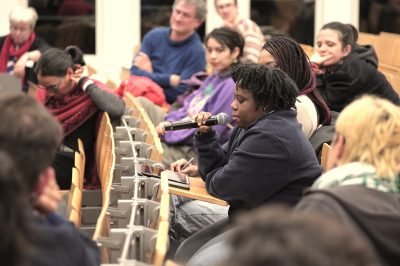Image by Nikolai Kanow.
Mecila Civil Society Workshop 2024 in Berlin: Together at last?
Global Convivial Forum
The interview conducted in writing on February 7 2024, by Katrin Schlotter, was first published on the BMBF Webpage, under “Rahmenprogramm Geistes- und Sozialwissenschaften (GSW)”.
Translated from German by Nina Leibbrandt.
Image by Nikolai Kanow.
From 18 to 20 January 2024, the Institute for Latin American Studies at Freie Universitӓt Berlin and Mecila hosted the Mecila Civil Society Workshop 2024 in Berlin, which discussed the topic of climate interdependencies between Europe and Latin America. Mecila spokesperson Prof. Dr. Sérgio Costa presents the most important topics and findings.
At Mecila, you investigate past and present forms of social coexistence in Europe and Latin America. What influence do the effects of climate change have on the reciprocal relations?
Issues relating to climate change are ideally suited to examining the interaction between inequality and conviviality from a transregional perspective. Thus, the effects of human activities on the climate are not bound to a specific location: No matter where on earth climate-damaging emissions occur, it is known that they have consequences for the entire planet. But the social and environmental damage caused by these activities is unevenly distributed both socially and geographically. These initially abstract interdependencies were illustrated using specific cases in our workshop.
A good example is electromobility, which is at the heart of the German and European decarbonization strategy. In this regard, the contributions of an environmental activist from the Brazilian Jequitinhonha Valley, now renamed the Lithium Valley, and the representatives of the Grünheide citizens’ initiative in Brandenburg, which is fighting against the expansion of a so-called gigafactory for electric cars, were particularly relevant. During the exchange between activists and researchers, it became clear that individual electromobility contributes to better air quality, especially in cities, but that in the overall balance it has enormous social, environmental and climate consequences both in Latin America and Europe.

How can Mecila contribute to a better understanding and management of the effects of climate change?
In addition to comprehensive interdisciplinarity, the Mecila Center has followed the principle of transdisciplinarity since its foundation in 2017. This covers methodological approaches that consciously reject the rigid separation between “subjects of knowledge” (scientists) and “objects of knowledge” (groups under investigation). Rather, it is a dialogical and collaborative work process in which scientific and practice-oriented approaches intertwine. This concept was given a more concrete form in the workshop and proved to be extremely productive. It became clear that indigenous and other so-called traditional communities make a genuine contribution to understanding and overcoming the climate crisis through their philosophies and ways of life, in which people and nature are not seen as separate entities but as a continuum. Science, on the other hand, sheds light on the complex entanglements that make up climate change.

The motto of your workshop was “Together at last?”. Which topics were discussed particularly intensively?
The history shared between Europe and Latin America has been characterized by colonialism, slavery and economic dependence. In the workshop, we asked ourselves whether climate change would fundamentally alter the relationship between the two regions. The provisional answer is: unfortunately not. At least in the short term, Europe and especially Germany are in a position to export the costs of climate adaptation and their own crises. This became particularly clear in the discussions on German coal imports from Colombia. The contributions by an environmental and women’s rights activist from the indigenous Wayuu community and a human rights activist from the indigenous Yupka community made it clear how the growing demand from Germany following the interruption of Russian coal imports is inextricably linked to the contamination of water sources, the destruction of habitats and famine for various indigenous communities and peasants in Colombia. Moreover, the drastic consequences of coal mining and the corresponding combustion for global warming are well known, regardless of the region of the world in which this takes place.
What is your conclusion about the event? Are there any solutions?
The dialog between researchers and activists on climate issues highlighted the urgency of replacing national pseudo-solutions to the climate crisis with planetary perspectives. The importance of the interdependencies between the different regions of the world as well as between humans and nature for the maintenance of life on the planet is becoming the focus of interest in terms of knowledge and action.
What other events are planned for 2024?
I would particularly like to highlight our Annual Meeting, which will take place in São Paulo from October 7 – 11, 2024. Other exciting Mecila events take place almost weekly, as you can see in our program of activities.
Thank you very much for the interesting interview, Prof. Costa!
